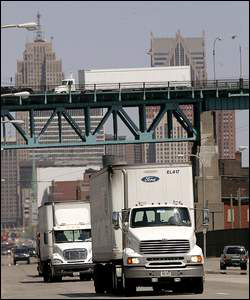 |
 |
 |
 Editorials | Opinions | September 2007 Editorials | Opinions | September 2007  
Give Mexican Truckers a Chance to Drive in U.S.
 The Detroit News The Detroit News
go to original


| Trucks have long been crossing the U.S.-Canada border, notably at the Ambassador Bridge, which spans the Detroit River. (Ricardo Thomas/The Detroit News)

Rules and Regulations
Under the one-year demonstration program:
• Mexican trucks would have access to U.S. roadways to deliver goods from Mexico.
• They would not be allowed to pick up and deliver cargo within the United States.
• About 500 Mexican trucks from no more than 100 companies will get approval.
Source: U.S. Department of Transportation |
A pilot program is under way to allow Mexican trucks and drivers to enter the United States with cargo as part of the North American Free Trade Agreement. The move has brought protests from the Teamsters union, but the program deserves a fair chance.

Fear of competition is the real issue here, though the Teamsters union has thrown every Chicken Little argument in the book at the public to see if one will stick.

It has been claimed that Mexican drivers didn't speak enough English to read road signs and safely traverse the highways here. The union argued that Mexican trucks are dirty and will add untold pounds of pollutants into the environment. It is claimed that Mexican drivers would cross over doped up or drunk and that the companies would smuggle illegal immigrants into the United States. And on and on.

Though those claims are overstated, the Bush administration has agreed to work with the union to address the issues. The pilot program, which began last week, would allow 100 Mexican trucking companies complete access to United States roadways after they've been inspected and approved by federal transportation officials.

This is in addition to the requirements for Mexican trucks, just like Canadian trucks, follow the safety standards and laws of the United States.

If the union's claims are correct, they'll be revealed with this pilot program and appropriate action can be taken.

If not, then the program should be allowed to expand. The union has spent the past 15 years soliciting help from Congress and the courts to stop provisions in the North American Free Trade Agreement that allowed cross border trucking between Canada, the United States and Mexico.

On Thursday, a U.S. trucking company from Texas was given approval to operate in Mexico and a Mexican company was given the first approval to cross into the United States.

Canadian trucks have freely crossed the border into the United States for years. Mexican trucks have been confined to about a 25-mile limit at the border where goods have to be moved to big rigs driven mostly by Teamsters. It's an expensive and time-consuming process that results in traffic jams, border crossing delays and increased costs for consumers who pay extra for the inefficient process.

"This long-awaited project will protect public safety on American highways as we work to both save consumers money and help our economy," said John Hill, administrator of the Department of Transportation's Federal Motor Carrier Safety Administration.

We'll soon find out if the doomsday scenarios the Teamsters predicted are realized. We're betting that's not likely to happen. | 
 | |
 |



